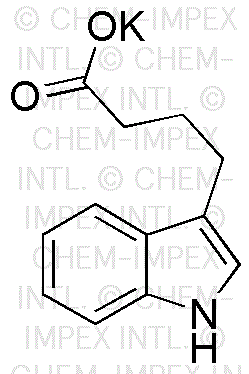Indole-3-butyric acid potassium salt is widely utilized in research focused on:
- Plant Growth Promotion: This compound acts as a rooting hormone, enhancing root development in various plants. It's particularly beneficial for horticulturists and agricultural professionals looking to improve plant propagation and survival rates.
- Crop Yield Improvement: By stimulating root growth, it helps plants absorb nutrients more effectively, leading to increased crop yields. Farmers can use it to boost productivity in their fields, especially in challenging soil conditions.
- Biotechnology Applications: In tissue culture, this salt is essential for the successful propagation of plant cells. Researchers in biotechnology can leverage it to develop new plant varieties with desirable traits.
- Environmental Remediation: It can be used in phytoremediation strategies to enhance the growth of plants that help clean contaminated soils. Environmental scientists can apply it to support sustainable practices in polluted areas.
- Research in Plant Physiology: This compound is valuable for studies investigating plant hormone interactions and responses to environmental stress. Academics and researchers can utilize it to gain insights into plant growth mechanisms.
Informations générales
Propriétés
Sécurité et réglementation
Applications
Indole-3-butyric acid potassium salt is widely utilized in research focused on:
- Plant Growth Promotion: This compound acts as a rooting hormone, enhancing root development in various plants. It's particularly beneficial for horticulturists and agricultural professionals looking to improve plant propagation and survival rates.
- Crop Yield Improvement: By stimulating root growth, it helps plants absorb nutrients more effectively, leading to increased crop yields. Farmers can use it to boost productivity in their fields, especially in challenging soil conditions.
- Biotechnology Applications: In tissue culture, this salt is essential for the successful propagation of plant cells. Researchers in biotechnology can leverage it to develop new plant varieties with desirable traits.
- Environmental Remediation: It can be used in phytoremediation strategies to enhance the growth of plants that help clean contaminated soils. Environmental scientists can apply it to support sustainable practices in polluted areas.
- Research in Plant Physiology: This compound is valuable for studies investigating plant hormone interactions and responses to environmental stress. Academics and researchers can utilize it to gain insights into plant growth mechanisms.
Documents
Fiches de données de sécurité (FDS)
La FDS fournit des informations de sécurité complètes sur la manipulation, le stockage et l’élimination du produit.
Spécifications du produit (PS)
Le PS fournit une description complète des propriétés du produit, notamment sa composition chimique, son état physique, sa pureté et les exigences de stockage. Il détaille également les plages de qualité acceptables et les applications prévues du produit.
Certificats d'analyse (COA)
Recherchez des certificats d'analyse (COA) en saisissant le numéro de lot du produit. Les numéros de lot et de lot se trouvent sur l'étiquette d'un produit, après les mots « Lot » ou « Lot de fabrication ».
Numéro de catalogue
Numéro de lot/série
Certificats d'origine (COO)
Ce certificat d'exploitation confirme le pays dans lequel le produit a été fabriqué, et détaille également les matériaux et composants utilisés et s'il est issu de sources naturelles, synthétiques ou autres sources spécifiques. Ce certificat peut être requis pour les douanes, le commerce et la conformité réglementaire.
Numéro de catalogue
Numéro de lot/série
Fiches de données de sécurité (FDS)
La FDS fournit des informations de sécurité complètes sur la manipulation, le stockage et l’élimination du produit.
DownloadSpécifications du produit (PS)
Le PS fournit une description complète des propriétés du produit, notamment sa composition chimique, son état physique, sa pureté et les exigences de stockage. Il détaille également les plages de qualité acceptables et les applications prévues du produit.
DownloadCertificats d'analyse (COA)
Recherchez des certificats d'analyse (COA) en saisissant le numéro de lot du produit. Les numéros de lot et de lot se trouvent sur l'étiquette d'un produit, après les mots « Lot » ou « Lot de fabrication ».
Numéro de catalogue
Numéro de lot/série
Certificats d'origine (COO)
Ce certificat d'exploitation confirme le pays dans lequel le produit a été fabriqué, et détaille également les matériaux et composants utilisés et s'il est issu de sources naturelles, synthétiques ou autres sources spécifiques. Ce certificat peut être requis pour les douanes, le commerce et la conformité réglementaire.


